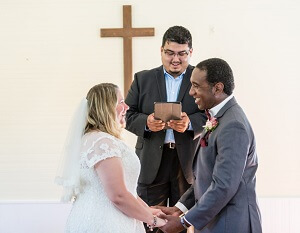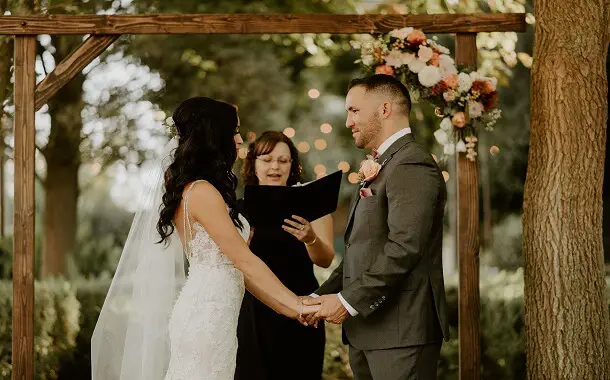How Much Does a Wedding Officiant Cost?
If you’re planning a wedding, you’ll need to budget for an officiant to make the marriage legal and binding. So what is the typical cost for wedding officiant services? The average officiant fee in America is around $300.
The cost of a wedding officiant for most couples is anywhere from $200 up to $450 when all is said and done. Exact pricing often depends on your location, chosen officiant, and overall ceremony vision. This article breaks down key details brides and grooms need to know about budgeting for wedding officiation services.
How Much Does a Wedding Officiant Cost?
Officiant rates range widely state-to-state and officiant to officiant across the country. On the lower end, some officiants may charge only $100-$150 for a simple courthouse elopement. On the higher end, experienced religious leaders known for crafting meaningful ceremonies can command $600-$800.
As a national benchmark, a Wedding Wire survey found the average cost most couples across America pay for a wedding officiant’s base fee falls around $300. However, only 27% actually pay rates in that exact middle range according to this analysis. About a third pay under $250. And well over a third fork out more than $350 when all is said and done after extras.
Brides.com states that the cost of an officiant ranges from $300 to $500. However, depending on your location, the cost may vary.
According to Texas Wedding Ministers, the national average cost of a professional wedding officiant ranges from $266 to $900 depending on the region. Their prices, on the other hand, are from $200 to $750+, depending on location, the addition of rituals, customized vows, wedding rehearsal, pre-marital coaching, and more according to their official website.
A discussion on officiant prices on Reddit had some users expressing surprise at the cost of officiants, ranging from $400 to over $1,000 for different packages.
Why Does An Officiant Charge for Wedding Services?
Before sticker shock sets in, it’s important to understand why most qualified officiants charge meaningful fees that might exceed budget expectations. Conducting a customized, legal wedding ceremony requires an investment of specialized skills, time, and responsibilities on an officiant’s part. Key elements an officiant provides that add value include:
Ceremony Customization – Most couples want a meaningful ceremony flavored with personal touches versus a generic off-the-shelf script. So officiants invest hours collaborating with couples to brainstorm and then craft customized ceremonies (often 3 hours on average or more).
Rehearsals + Wedding Day Management – Many officiants attend the wedding rehearsal and then coordinate the event itself so all unfolds smoothly per plan on the big day (hourly fees may apply).
Legal Paperwork – Officiants ensure all bureaucratic marriage license forms and certificates get properly completed, signed by required parties, and filed after the ceremony to activate the marriage (with follow-ups if issues arise).
Travel Expenses – For destination weddings or ceremonies far from an officiant’s home base, travel costs often get billed on top of base rates.
What Factors Impact Wedding Officiant Pricing?
Much like catering and reception venue costs, wedding officiation prices shift based on where celebrations happen and who couples book. Important pricing factors include:
Officiant Experience Level – Religious leaders and professional civil officiants known for repeatedly crafting 5-star custom ceremonies that make marriages meaningful command higher rates (often $500+). New officiants building skills and portfolios charge less (as low as $150-$200).
Day/Time – Weekend ceremonies often cost more due to peak demand. Friday/Sunday discounts are sometimes offered along with lower rates for small courthouse weddings.
Location – Major metro area average rates run over $400 thanks to higher costs of living. Small-town officiants may charge half as much.
Extra Duties – Add-ons like having the officiant attend rehearsal, facilitate pre-marital counseling, and help pen custom vows increase costs.
What Other Officiant-Related Expenses Come Up?
On top of an officiant’s contracted service fees, couples often encounter a few budget surprises to account for like:
You might also like our articles on the cost of wedding vow renewal, courthouse weddings, or eloping for a wedding.
License Rush Fees – Couples risk extra county clerk fees if an officiant must expedite marriage license processing thanks to last-minute ceremony changes or procrastination.
Vendor Gratuities – While not strictly required, it’s customary for couples to tip wedding vendors that provide exemplary service – including gifted officiants. Some religious leaders instead expect donations to be made to their affiliated institutions.
How Can Couples Save on Officiant Spending?
If paying top dollar for premium wedding ceremony officiation assistance goes over budget, here are five smart ways to control costs:
Book Early – First dibs on an experienced officiant’s calendar often means paying base rates before fuel surcharges, peak weekend fees, and more extras enter pricing models closer to busy seasons.
Find Sponsor Discounts – Some officiants offer special savings for couples booking the venue and vendor bundles all sourced from the same hotel, resort, or wedding coordinator company.
Communicate Efficiently – Consolidating questions into a few email exchanges versus peppering an officiant hourly can pare down change order costs over the planning period.
Trim Guest Lists – Travel costs make large guest counts expensive if ceremonies are held far from an officiant’s office.
Provide Lodging – For destination weddings, couples save by covering an officiant’s hotel costs directly versus higher bundled travel rates.
What Exactly Does an Officiant Do?
 An officiant has a vital job on your big day – carrying out the marriage ceremony to make your union legit. An officiant can be a religious leader like a minister, rabbi, or priest. But it also may be a judge, justice of the peace, or professional certified to perform marriages in that state.
An officiant has a vital job on your big day – carrying out the marriage ceremony to make your union legit. An officiant can be a religious leader like a minister, rabbi, or priest. But it also may be a judge, justice of the peace, or professional certified to perform marriages in that state.
The officiant’s #1 duty is planning and leading a meaningful ceremony personalized to fit you as a couple. They work with you to shape a special service, whether it’s religious or secular. Traditions are incorporated that resonate for you and important people in your lives when they officiate.
Officiants also handle the legal side confirming all paperwork that makes a marriage binding and official gets filed properly.
Many provide pre-marital counseling as well. And some attend the wedding rehearsal to get ready for showtime!
When Should You Book an Officiant?
We advise locking down an officiant around 7 months before “I do’s.” After deciding what type feels right, look at reviews of ones near your venue. Interview top contenders ASAP, ideally face-to-face.
Once booked, you’ll meet with them starting about 3 months out to craft the entire ceremony. But don’t wait longer than needed – good ones go quickly!
When to Donate?
Donations normally go to an officiant’s affiliated house of worship – synagogue, church, mosque, etc. This route is recommended when a faith leader conducts the service.
What Should You Ask Before Booking?
It’s very important to meet with your lead candidate officiants prior to hiring one for getting married. Once booked, you’ll collaborate a ton so make sure you mesh! Areas to address:
- Ceremony style limitations or customs
- Expected meetings and communication modes
- All fee information – basic + potential extras
- Attire plans
- Ceremony timeframe
- Rehearsal attendance and fees
- Opportunities for customization and personal touches
- Marriage license help they provide
- Guidance around writing your own vows
Let your officiant know other special requests too! The more details covered upfront, the smoother wedding planning will go.


Leave a Reply
Want to join the discussion?Feel free to contribute!